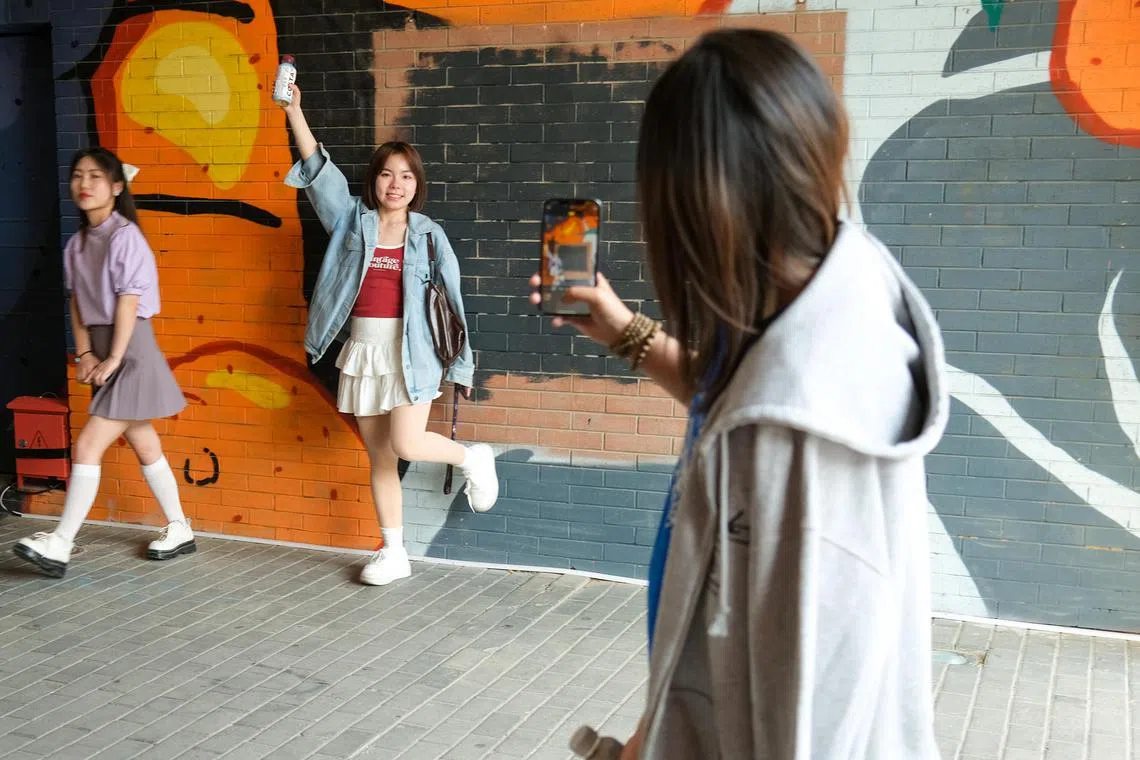Letter From Beijing
‘Wang hong’ culture booms in China as more young people dream of becoming influencers
Sign up now: Get insights on Asia's fast-moving developments

Many Chinese tend to emulate someone they follow online by travelling to the same locations and taking similar pictures.
ST PHOTO: AW CHENG WEI
BEIJING - When classes at Mr Zan Neng’s music school were forced to stop because of China’s pandemic controls in 2021, he turned to social media to share his music – a move that has amassed more than six million fans for him so far.
“I did not expect so many people to respond so positively to my music. I’m really very touched by their support and kind words,” he said. Mr Zan posts videos of himself playing the piano and singing – sometimes with his wife – cover versions of popular Mandarin songs such as Jay Chou’s Ju Hua Tai, Rene Liu’s Hou Lai and Jeff Chang’s Guo Huo.
On his account on Douyin, the Chinese version of TikTok, netizens praise his live streams for providing solace to them during a difficult time and comment on how soothing his voice is.
“I feel so alone when I’m under lockdown, but when I come online to listen to Teacher Zan singing live, with everyone here (virtually), I feel like I’m in the company of family,” said one netizen.
Mr Zan’s rising fame as one of Douyin’s top influencers has also attracted the eye of advertisers, who have come knocking and made him a part of China’s booming “wang hong” culture. He also has 510,400 followers on Kuaishou, Douyin’s competitor, and 353,700 others on Xiaohongshu, another popular social media and e-commerce platform.
Wang hong are online personalities who work with brands to feature their products in posts, or sell them directly to viewers if they have their own live-streaming services or e-shops. Live-streamers, who organise direct sales, are a subset of influencers.
Mr Zan, for one, has worked with speaker and earphone manufacturers, and sells their products under his own label.
The latest data from the National Bureau of Statistics in 2023 showed that China’s influencer economy is set to hit 6.7 trillion yuan (S$1.3 trillion) by 2025, up more than five times from the 1.3 trillion yuan in 2020.
Chinese advertising firm Ping Jia Da Ren said in a report in 2023 that there were an estimated 10.1 million wang hong in China with a fan base of more than 10,000 followers each between September 2021 and October 2022. They publish an average of 38.3 million posts daily.
Ms Olivia Plotnick, who runs social media marketing agency Wai Social in Shanghai, said that more companies are likely to turn to micro-influencers in the future, as firms as well as audiences seek new types of content and creators with a more personal touch. Micro-influencers are wang hong who respond and interact with their followers to keep them engaged, and tend to have a smaller but niche fan base.
“A large following can be attractive (to companies), especially when it comes to celebrities or big events such as flagship store openings... But, for long-term projects, companies assess an influencer’s relevance to their target audience, engagement rates, content quality, authenticity, and alignment with their brand values,” she noted.
The question of how much influencers in China can earn became a hot topic in 2021, when China’s former top live-streaming queen Huang Wei, better known by her online moniker Viya, was fined 1.34 billion yuan for evading tax payments of about 700 million yuan between 2019 and 2020.
Netizens began speculating about how much Ms Huang makes as a live-streamer, given the massive fine imposed. Ms Huang, whose social media accounts are no longer available online, and her husband were listed in financial magazine Forbes’ world’s richest 500 individuals in 2021, with an estimated fortune of 9 billion yuan.

Former top live-streaming queen Huang Wei was fined 1.34 billion yuan for evading tax payments of about 700 million yuan between 2019 and 2020.
PHOTO: BLOOMBERG
There was seemingly nothing Ms Huang couldn’t sell through her live streams and e-shop in her heyday, be it small items like snacks and facial cleansing products, or big-ticket purchases such as properties and cars. She even sold a rocket launch service – which was reportedly initiated by Chinese entrepreneur Luo Yonghao, who started his career in e-commerce – for about 40 million yuan in April 2020.
But top-tier live-streamers like Ms Huang, whose success was due to a combination of good looks, savvy product choice and a promise of finding the best deals for her viewers, are rare.
According to a 2020 report by Beijing-based headhunting website Boss Zhipin, nearly half of China’s one million live-streamers had fewer than 10,000 followers each, while most live-streaming hosts had a monthly income of between just 8,000 yuan and 15,000 yuan. While there are those who dream of making it big, others say they simply enjoy the interaction with followers.

Mr Zhao Peidong’s boyish good looks attracted a following to his Xiaohongshu account, which he started in July 2021.
PHOTO: XIAOHONGSHU
One of them is Mr Zhao Peidong, 31, who has about 9,200 followers on Xiaohongshu. Mr Zhao said he first received a request to endorse a home fragrance about a year ago, when he had some 4,000 followers. But his first paid collaboration came in November 2022, for a mattress brand, for which he was paid about 1,800 yuan.
His boyish good looks attracted a following to his account, which he started in July 2021. He now shares photos of his home – his bedroom makeover in April 2022 gained him 600 new followers – what he wears, and interesting spots around Beijing.
“At that time, I had just wanted to share my life,” said Mr Zhao, who works for an Internet company. “Through my account, I’ve also made many new friends.”
Mr Zhao said he would not mind recommending products he likes to his fans, even if he was not paid for it, but does not plan on quitting his job and giving up a stable income to focus on growing his fan base.
“I have not deviated from my original intention of just purely wanting to share bits of my life,” he said.
As for Mr Zan, he, too, continues to run his music school, but now has just a few students he teaches in person.

Mr Zan Neng posts videos of himself playing the piano and singing cover versions of popular Mandarin songs.
PHOTO: DOUYIN
“I used to have hundreds of students, but I’ve had to cut back on my teaching hours to focus on producing content for my social media accounts,” he said.
He has also hired two assistants to go through the tens of thousands of messages he receives on his social media accounts.
Right now, he is focusing on coming up with the best cover versions of songs from the 1970s and 1980s. “Love songs from that period, or songs that are much more soothing, are most popular with my followers,” he said.
Recording the songs can require many takes, he added.
Through his account, he sells his songs on a thumb drive (199 yuan each), and speakers and earphones (both 199 yuan each) under his own label.
He is also thinking about writing his own songs and is planning to release online classes and learning material on how to play the piano and sing.
“It is entirely possible to rely on the income from brand collaborations to make a living, but I will not give up my music school because it is my passion,” he said. He would only say that the income from his social media accounts is “slightly higher than that of running a music school”.
Professor Li Xinxiang of the Communication University of Zhejiang in eastern China, who runs a course on the short video-streaming and influencer economy, said that the work of an influencer, especially on Douyin, has become harder than ever.

A job survey by China’s official Xinhua news agency in 2018 found that 54 per cent of those born after 1995 aim to become influencers.
ST PHOTO: AW CHENG WEI
“The way Douyin decides what content to push to viewers is very different from the way, say, Taobao, does it,” Prof Li said.
Taobao, the e-commerce giant owned by Alibaba, and other platforms tend to push content from very popular accounts to users, which draws more traffic to established influencers, but Douyin is constantly looking out for the “next new thing”, he added.
This means even influencers with a big fan base on Douyin cannot rest on their laurels and must continue to come up with fresh, engaging content.
Prof Li said that his class is designed to give students “a taste of what it is like to be an influencer, to have to keep coming up with content, which can be very challenging”.

There were an estimated 10.1 million wang hong in China with a fan base of more than 10,000 followers each between September 2021 and October 2022.
ST PHOTO: AW CHENG WEI
It also aims to dispel misconceptions that young Chinese may have about the “easy life” of influencers. Many Chinese tend to emulate someone they follow online by travelling to the same locations and taking similar pictures, but that is not what it takes to become an influencer, Prof Li said.
A job survey by the official Xinhua news agency in 2018 found that 54 per cent of those born after 1995 aim to become influencers.
Prof Li said: “Even if the students do not decide to become full-time influencers – only one or two every semester do – their experience of trying to grow their fan bases and managing their social media presence will help them get a leg-up with employers.”



